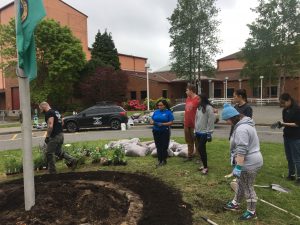5 Future Direction
Jonathan Kwong
Conclusion
How can biotechnology help honey bees combat against CCD?
Biotechnology can be used to genetically modify bees to combat parasites. Scientists can breed hygienic strains in honey bees that allow them to identify Varroa destructor mites on other bees and bite them to damage the parasite. Bees that practice this hygienic behavior tend to have fewer mites on themselves, compared to their non-biting counterparts. Additionally, scientists can look into incorporating Varroa sensitive hygiene (VSH) into bees, which allows honey bees to locate and remove mites capped in brood. In both instances, colonies with high Varroa grooming rates have lower Varroa populations as a result.
Future Direction: Think Globally and Act Locally
How can everyday people help honey bees combat CDC?
-
- Plant native, bee-friendly plants and flowering herbs
- Give bees a diverse diet.
- Don’t remove all your weeds
- Some weeds like dandelions can save an entire colony.
- Don’t use pesticides to treat your lawn
- They may make your yard look cute, but the honey bee colony won’t look cute when they’re all dead.
- Put a small basin of fresh water outside for bees
- Hydrate or diedrate.
- Raise awareness so others can help
- Work as a colony to help a colony.
- Plant native, bee-friendly plants and flowering herbs

Beyond the Classroom
One of the main issues and potential causes of CDC are crop monocultures and the overall scarcity of resources available to honey bees. Using what we learned from our project, Annika and I spearheaded planting the first pollinator garden at our school with our high school’s Ecology Club. As the presidents of this club, we were able to successfully write over $2,000 worth of grants and partnered with the Northwest Honey Bee Habitat Restoration to find bee-friendly plants and design our garden. The garden was implemented in June 2018 using land that was provided to Eco Club from the Mountlake Terrace High School Parent Teacher Student Association, which is now known as the Mountlake Terrace High School Parent Boosters Club. After successfully implementing the garden, we saw an increase of pollinators and even had bunnies in our garden. While we might not have the materials and means to eradicate a terrible disease, we can do our part to mitigate the problem and provide safe spaces for pollinators throughout our community. As such, Annika and I have also led Eco Club to partner with the Mountlake Terrace Garden Club to plant flowers around the city of Mountlake Terrace to beautify the areas and provide nutrition for bees and other pollinators.

